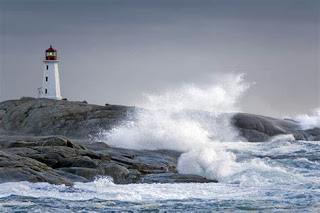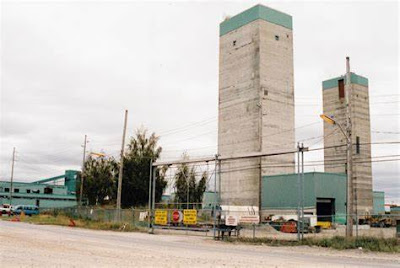Weather was touch and go in Halifax, what with a hurricane passing us by, just off the coast. It was cool much of the time. Go figure. Nothing a windbreaker or a shell couldn’t handle.
We began another wet day shopping in the mall. I bought too much in Banana Republic before we repaired to Spring Garden Road, where I was much more discerning, much more reserved. We had lunch at “Your Father’s Moustache,” crazy name, great roadhouse, before shopping again, this time at MEC, the harbor front and Spring Mountain Road again. Apparently, this was our shopping day. But what are you going to do when the sky opens up and the clouds release a biblical torrent?
We ate supper at “Murphy’s on the Water,” treated to a lobster deal for having booked a tour with the Hopper. It was our first time eating lobster out of the shell, the way you’re supposed to. I had to admit to our waitress when our meals arrived, “We really don’t know what to do here. Can we get a bit of a tutorial?” She laughed and did just that. It’s amazing how people will bend over backwards to help you if you ask with a smile.
We strolled the harbor front and the city by night, relaxing at the Economy Shoe Shop over Bailey’s and a Propeller IPA before returning to the hotel where I took another dip in the pool.
We’d booked an excursion while on the pier so we woke early, waiting in the lobby for our pick-up. We’d opted for Day Tripper Tours, a small independent, on the say-so of the tourism table: small shuttles, fewer people, more places on the agenda than there were with Blue Line Tours, for the same price. It was worth it. Greg, our driver, was on time, affable and a font of local lore. He was also an old boy, mid 50’s, a tad overweight and characteristically and stereotypically jolly. He may have been gay. He was most definitely from New Brunswick. He told us so during our introductions. Not that he was gay. That he was from New Brunswick.
Along for the ride was an aged Toronto couple, the only others on the excursion: Anne and Nicholas, she a lover of churches, he a military history buff.
We went to Peggy’s Cove first, briefly stopping at a monument to the victims of Swiss Air 111. What can I say about Peggy’s Cove? It’s sparse, just a tiny fishing village set upon rolling rocks with its uber-famous lighthouse far out where the sea and land collide. The smoothed rocks roll, small pools collected in the nooks and crannies. Don’t kid yourself, it’s a hike, but worth the effort. And would have been even more spectacular if the sky was blue and not grey, were the wind settled and calm, the seas gentle. Damn offshore hurricanes.
Bev bought three watercolours from a local artist. That in itself was worth the stop.
We traced the coast, wending through storybook towns and skirting more rocky coves than we could count until reaching Mahone Bay and Lunenburg, where the Bluenose was built. It was not there, the Bluenose II, a bit of a disappointment, but it tours the world, so don’t count on it being there if you visit. We did visit the Fisheries Museum and crawl over and through a couple historic fishing schooners…but not the Bluenose. Late lunch at the Fisheries Museum, then we walked the streets of the World Heritage Site, taking in the array of colours nestled together. It’s brightly painted, much like most of the east coast, but the pallet of colours is so varied that you’d think that whatever paints didn’t sell were on sale and that the people who lived there couldn’t pass a good sale up. We took a photo from the golf course across the bay, the photo untold millions of tourists must take. I’m surprised the gold course hasn’t banned tourists from their site, altogether. It must be hell on the grass.
An hour’s drive brought us back to Halifax. A rather uninspired search led us
back to the Economy Shoe Shop for nachos and personal veggie pizzas. I say
uninspired because the city is teeming with places to eat.
The next day we had breakfast on the wharf at the Harbourside Market. We took
the ferry across to Dartmouth to see what was there. A park, a lake, a rowing
competition in progress.
We returned and had lunch at the Old Triangle Pub (I had a Garrison Raspberry Ale while there, very nice, I’d never had a raspberry ale before), then Bev went back to the room for a nap while I visited the Maritime Museum. There was a lot of history to take in, in such a short time: The Fall of Louisburg, the Age of Sail, the Age of Steam, the Explosion, the Titanic. What can I say? Ships of bygone days are beautiful, seemingly delicate constructs of masts and spires and line and sail, that weathered the same storms as those that sweep across the seas today. Their line and grace and woodworking, shame those we make today.
We had supper at Bubbles’, a horrific experience, at best. The ambiance was
fun, but I was never a Trailer Park Boys fan, so I’d probably have rather eaten
at the Lower Deck or the Split Crow, instead. My burger was fine, but Bev’s
ribs wore a layer of barbeque sauce equally as thick as the meat.
My preferences were, in no particular order, The Five Fishermen, The Old
Triangle, The Lower Deck, Your Father’s Moustache, with special notice to
Murphy’s Restaurant out on the pier and the Economy Shoe Shop.
Special shout out to Cows, on the pier, a tiny little yellow shack that sat out over the water, its plastic cow hanging out at the entrance, luring the unsuspecting in. It was great ice cream, as good as Farquhar’s on Manitoulin.
I did drag Bev down to the Split Crow for a final drink. I don’t think she had a good time. It was packed in there, and service was slow if you didn’t take an aggressive approach to catch their notice. It was worth the effort, in my view; the music was phenomenal, the players obviously having played music since they could hold an instrument. Most people I saw played and sang better than almost everybody I’d ever seen, professionals included.
Then to bed, relatively early, by all accounts. We had a flight the next day to Quebec City, to take in the tail end of their 400th year celebration.
We loved Halifax, but we’d also had our fill of grey skies and periodic precipitation. That made the hours of glorious sunshine all the more satisfying, but there wasn’t enough of it. We wore shells much of the time, rarely out without an umbrella.
We hoped the weather the next week would be better.
It was.
























